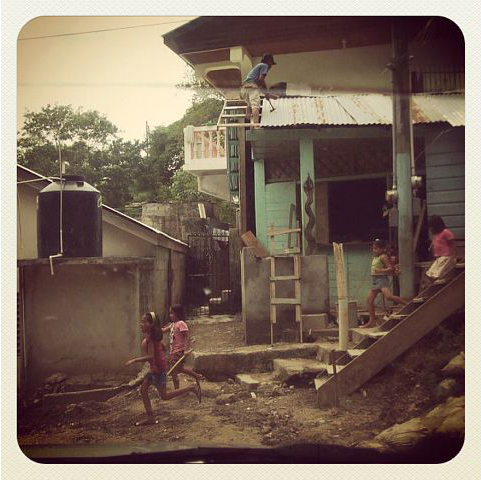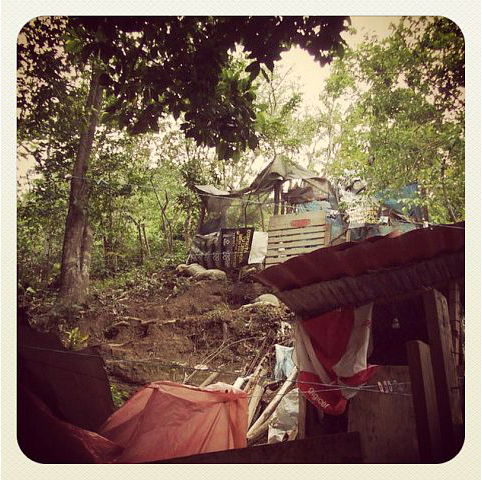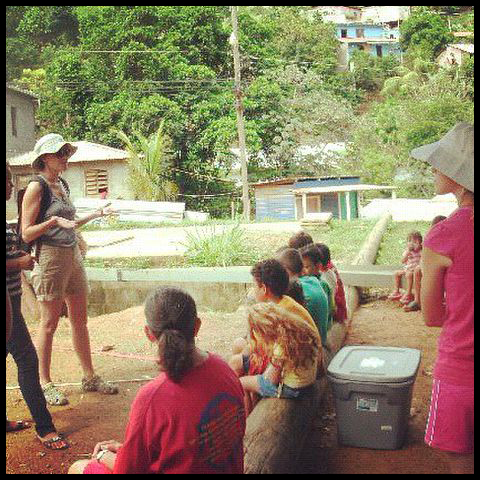Day 3. Enrique arrives after breakfast, and we climb in the back of his truck with our gear. We fill water jugs at Henry’s house and begin the ascent to the Colonia. The roads are badly eroded from rains. Some aren’t navigable. Enrique’s Toyota creaks and rocks as we climb. We’re at such a steep angle we can see the hood of the truck but not the road. The foot traffic is dense. The cars are just as talkative as at the airport, beeping their island chatter as they whir past.
A commercial truck beeps as it heads up, nose to the sky and dust trailing. On top the truck is a loudspeaker belting out a recorded sales pitch. The tinny sounds of music spill out from an open-air market. Pepsi signs cover the windows. A toddler in a diaper plays on the road. The truck beeps as it squeezes confidently past, just shy of the baby’s hand. I shudder at my imagination. Small children carry even smaller children across the road behind the truck. They run in and out of markets like bugs scurrying at sudden light, always carrying something too big — a sibling, a trash bag, a 5-gallon bottle of water. The incline is steep, and the smell of a wood fire mingles with the smell of garbage.

A market in la Colonia

A house in la Colonia
I watch as a pregnant woman pauses to catch her breath, two children carrying eggs and groceries beside her. She rests a moment, a bag on her hip, before climbing an even steeper path up the mountain. Dogs trot easily past her. I’m watching Bailey who is next to me. Her eyes are big like they were on the plane, and I can tell she’s looking at the dogs. They’re emaciated, as if their ribs were just a hanger for their skin. They’re covered with open sores, abscesses in varying intensities of red. I wonder at how she’s managing this scene, how she’s making sense of this ironic mix of palpable beauty and blatant poverty? Mike talks with Enrique in the cab of the truck, but Bailey and I are silent. A chicken grazes at pebbles across the road from the pregnant mother, and Enrique stops the truck. We’ve reached the site of the well.
I’d not have picked it out. At the center of a small concrete pad isn’t a pipe but a heap of concrete that looks like a drip castle, a monument left by a child who spent a long day on the beach. But that haphazard castle of concrete marks the pipe and protects the well until we can build a house around it. Once we’ve constructed the house, we’ll knock off the concrete mound and sink a pump down the pipe, hundreds of feet of line unwinding as it descends towards water, clean water. Henry, who has met us at the site, tells us the good news. We’re getting more water than hoped. This well will surpass the old, dysfunctional well by three-fold. We’re to dig trench around the pad so we can lay the concrete blocks that will form the walls of the pump house.
Mike and I leave most of the crew at the well site, taking Johnny and Bailey with us to an adjacent dirt lot where twenty or so kids wait to meet us and play games. Enrique’s given us a large blue Rubbermaid tub full of rope and cones. Michael, a thirteen-year-old boy who speaks English, helps us set up a Four Square court. He remembers us from a few years back. He says one of our team had given him a Georgia Bulldogs hat.
The kids are sitting on a steal beam at the edge of a ravine waiting their turn. Johnny corrals the kids in line. A teenager named Rixy officiates the game and helps translate for us. Four kids play in the court strung with rope. The ball rolls through someone’s legs and down the easement into a large hole half filled with water. It is yellowish brown and smells of sewage and decay. A boy scuttles spider-like down a twisting of rusted metal beams into the swill pit and retrieves the ball. Play continues. The ball drips dry as young brown hands bounce it from square to square. The kids are grinning. The sun is hot.

We stop when everyone’s had a turn, and then tell the story of God’s love for David. Rixy translates. God gave David victory over the enemy-giant, Goliath and saved Israel. Michael’s head is slightly cocked, listening. We hand out flavored water and cookies before breaking for lunch.
As day fades to night, we sit on the porch under Henry and Frances’ house where Enrique teaches a Bible lesson. The night air is clear and mild, but the mosquitoes are hungry. Michael and Rixy sit in plastic chairs among a dozen others. We bat at mosquitoes. Enrique teaches in Spanish. We scan faces for body language. A mother, who looks decades older than her actual age, squeezes my hand and says, “Gracias.” Her eyes are sincere yet full of pain and an unknown hardship. She is Michael’s mother.
Back at Casa Isabella we lay on the dock under a starry sky. The shoreline is dark compared to Florida, the constellations remarkably bright. So many stars are visible, the constellations are harder to find. We gawk and giggle at a shooting star. We lay and watch, growing sleepy. One of us yawns, setting off a domino train of yawns and sighs. We’re tired in that lovely way of bodies that sweated and baked in the summer sun all day, that at the end of the day had something to show for their labor.
